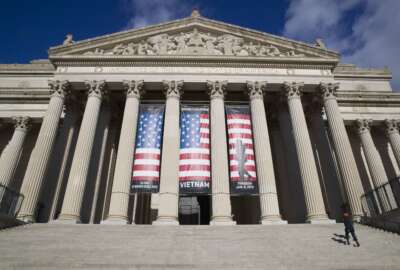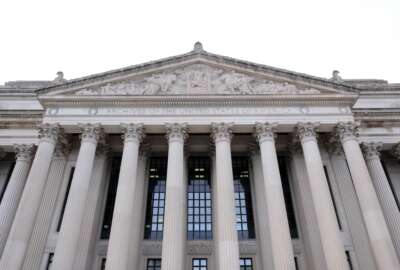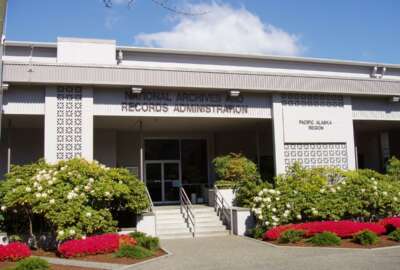Archiving things is not the sleepy job you might think it is
The National Archives is more than just a bunch of warehouses filled with old paper. Archiving and managing records is a profession unto itself. Now the Archives'...
The National Archives is more than just a bunch of warehouses filled with old paper. Archiving and managing records is a profession unto itself. Now the Archives’ National Historical Publications and Records Commission has established a leadership institute at the University of Virginia. For the details, Federal Drive with Tom Temin spoke with UVA archivist Brenda Gunn and the Commission’s Director for Access Programs, Nancy Melley.
Interview Transcript:
Tom Temin All right. And, Nancy, let’s begin with just a little bit of background on the National Historical Publications and Records Commission, a unit of the archives. What’s that all about?
Nancy Melley Well, the commission was actually founded at the same time as the archives back in 1934, but didn’t really do anything really until the early fifties when someone handed President Truman a copy of the papers and he wrote a note saying, This is really good stuff. We should encourage this. The commission then started meeting regularly and endorsing documentary editions. Documentary editions are publications of writings by people with contextual annotations and explanatory essays and something that historians like to do.
Tom Temin Got it. So a lot of these things don’t have multiple copies or many, many multiple copies, but there might be one more that has a note on the side and then you’d want that?
Nancy Melley If you want to take a good look at actually what documentary editions might look like in a digital age, Founders Online is a great place to start.
Tom Temin Okay, well, we will certainly do that. I want to get to the University of Virginia, and there is now a new center there. Ms.. Gunn, tell us what’s going on there.
Brenda Gunn Thanks, Tom. I’m glad to do it. And it’s good to be with Nancy because she and I were in archives leadership cohort together in. Well, we won’t tell the date, will we, Nancy? But it was in the earlier days of the institute.
Tom Temin But it was after Harry Truman, though.
Brenda Gunn It was it was after Harry Truman quite a bit, actually, after Truman. But so the University of Virginia will be the host of the Archives Leadership Institute in its next iteration. There’s been the original institute, which was at the University of Wisconsin-Madison. Then it moved to Luther College in Decorah, Iowa, then to Berea College in Berea, Kentucky, and then most recently to Purdue University. So we’re the fifth iteration of what I think is a growing tradition in investment, in leadership in the profession that NHPRC has made. And we’re real appreciative, obviously, of NHPRC’s support for University of Virginia’s iteration.
Tom Temin And what happens at these leadership institutes, the one you have now, and how does it support the mission of the National Archives?
Brenda Gunn Well, we’ll have 25 archivist or memory workers join us here in Charlottesville, and we’ll be talking about big picture issues in the archival field. And so in that respect, it supports NHPRC’s mission as NHPRC is very invested from the beginning, as Nancy said in the archival record, in good stewardship. And that’s what the memory workers and archivists who will come to Charlottesville and who have been a part of ALI from the beginning. What we’re doing, we’re working in various situations university archives, government archives, state, local records, museum settings. So we’re spread out all over the U.S. and coming at it from a variety of different situations. So we’re looking forward to having 25 more memory workers here in Charlottesville, and we’ll be discussing things like responsible stewardship and partnerships with community members and community archives. We’ll be looking at, of course, the individual, what self-knowledge and growth, who you are as a leader and how your capacity can be built over time. And we’ll talk about organizational leadership through a five day intensive experience.
Tom Temin All right. We’re speaking with Brenda Gunn. She’s an archivist at the University of Virginia and with Nancy Melley, director for access programs at the Archives National Historical Publications and Records Commission. And just quickly, this is a residence program for that period of time, or is this something that runs on and on throughout the year?
Brenda Gunn It’s a residence program. We’re inviting 25 individuals to leave their homes wherever they are across the U.S. and descend on Charlottesville. They’ll be living in probably one of the newer dormitories, residence halls here on the campus of the University of Virginia and will walk to class every day, Monday through Friday, which will probably be in the Special Collections Library and will have a set curriculum for the week, and that’ll include some interaction with faculty. It will include conversations and discussions with our steering committee. We even have plans to have some peer mentoring and peer cohort created experiential learning. But we also are going to get off campus and go out into the community.
Tom Temin Yeah, well, it’s a nice town down there to work. There are lots of worse places to spend five days than that around Charlottesville. Nancy, will some federal people be attending? Also, are these people from state and local archives and so on?
Nancy Melley There will be potentially federal attendees, federal archivists to attend. From what I can remember of the institute’s statistics, there have been one or two federal attendees in each cohort. So we’re talking about somewhere between 15 and 20 federal archivists who have gone through the program. One of the things that I think we find useful in NHPRC is that we’re helping archivists develop different muscles. So archivists know how to be archivists, but they don’t necessarily know how to be managers or supervisors or leaders in the profession. Something like, I want to say six or seven out of the last ten presidents of the Society of American Archivists are national professional organizations have been graduates of ALI.
Tom Temin Interesting. And by the way, can someone define the term memory worker? I confess I’ve never heard that term.
Brenda Gunn It’s a, I think, a collective noun for archivists, records, managers, curators, people who work in the library, archives and museum sector.
Tom Temin So people make sure we don’t forget. And if we do, we have a place to look it up.
Brenda Gunn Yeah, I think it’s really it’s an interesting term to me and it’s relatively new and we wanted to be inclusive of the program. Nancy knows that the intention is to bring in people who work in a variety of settings, and not everyone identifies specifically as an archivist, although they may be doing archival work. So we use the term memory worker as more of an inclusive term and to make sure that as many people can see themselves in this program as possible. And to the question about will there be federal archivists there? We certainly hope so. I mean, we intend to advertise ALI and this next iteration as widely as possible. And the cohorts really work when you have a diverse group of people from different settings, different parts of the country.
Tom Temin And aside from whether presidents or ex-presidents should store archival records in garages or chandelier bathrooms, what are some of the big issues in archiving now these days? I mean, what kinds of things will you all discuss down there?
Brenda Gunn I think we’re going to really focus on the archivist and archives in our place. And what I mean by that is we’re going to use the University of Virginia’s built environment, the Rotunda and the academical village and some of the events that have happened here over the last five or six years to talk about leadership in terms of some really tough subjects. History of enslavement, that’s certainly something that the University of Virginia continues to grapple with. And it doesn’t matter if you’re at a institute of higher education or a museum or a corporation, you probably have some history to deal with. And so one of the things I think we’re going to make sure we discuss with the cohort is narrative corrections. How do you be truthful about your organization’s history? And as we like to say, as Elaine Westbrook, who is the esteemed leader of the Cornell University Library, she said, “the receipts are in the archives.” And I love that quote, because the documentation for some of our events, big events in the country’s history, for small events in local history, whatever the receipts are in the archives, that evidence is there. And that’s what we’re here to steward. But other things that we’ll be talking about is also relationship building and trust building. One of the big topics in the archival field right now has to do with community archives, such as you can consider indigenous archives and Native American tribes and we’ll be talking about the University of Virginia is growing relationship with some of the Virginia Indian tribes in their archival work.
Tom Temin All right. Nancy, anything to add? Again, the big trends in archiving
Nancy Melley I agree with Brenda. The community driven archives is a very big trend, making sure that the entirety of our constituencies see themselves in the archival record, whether that is doing expand description of records so that they are more easily identified as coming from the community or affecting the community, or whether it is actually engaging the community in contributing records to the archives so that they can be preserved for the long term. Another trend that I see coming up fairly frequently is, and I don’t know the best term for this. Brenda, you actually probably know that know more about this than I do, is trauma related collections. How we respectfully present material that was created out of trauma but still make it available as best we can.
Brenda Gunn Right. Trauma informed archival practice. It is a very, very big thing and we do have that on the agenda for sure. And it’s not, when we think about trauma informed practice, we’re not just thinking about our researchers who come in to the reading room. We definitely are thinking about them and their responses to some potentially difficult subject matter in the materials they’re there looking at. But we’re also thinking about our memory workers, our archivists, and our exhibition curators who may be dealing with the same difficult information as they process a collection and they do description or they’re preparing an exhibition. So that’s yes, that’s definitely going to be on the agenda for the week.
Copyright © 2024 Federal News Network. All rights reserved. This website is not intended for users located within the European Economic Area.
Tom Temin is host of the Federal Drive and has been providing insight on federal technology and management issues for more than 30 years.
Follow @tteminWFED






